Forever Connected | The Class of 2020
Schulich Medicine & Dentistry’s Class of 2020 will forever be connected because of the COVID-19 worldwide pandemic.
As the world searched for answers and families found new ways to deal with loss, change and adapt day in and day out, students at the School tapped into their personal resources and resiliency to complete their programs.
Schulich Medicine & Dentistry couldn’t be more proud of all of their accomplishments and have chosen to celebrate their graduation by sharing five stories of the Class of 2020.
By Jennifer Parraga, BA’93
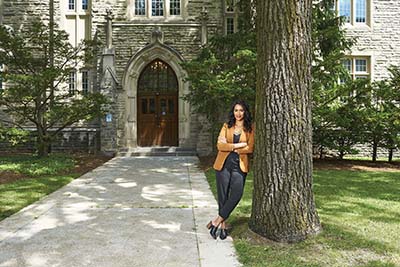 Dr. Luxey Sirisegaram
Dr. Luxey Sirisegaram
Postgraduate Education
Internal Medicine, Department of Medicine
The best part of this program has been my colleagues – the sense of collegiality and the family that we have created is unparalleled.”
“I want to figure out a way to create sustainable solutions, with emphasis on quality improvement measures especially in geriatric care.” — Dr. Luxey Sirisegaram
A third-year internal medicine resident, Dr. Sirisegaram found herself at the centre of the COVID-19 pandemic. She says that the culture of the program, that feeling of being part of a family, ensured that they were able to successfully handle the crisis that surrounded them.
“I’m so proud of how we’ve handled things during COVID,” she said. “We were faced with so much and Dr. Kane, our Program Director, made sure that our voice and experiences were heard, she advocated for us and ensured we could focus on what was most important – patient care.”
Born and raised in Markham, Ontario, Dr. Sirisegaram grew up fascinated with memory and how the mind worked. That interest led her to pursue an undergraduate degree in neuroscience and eventually to apply to medicine. It was during her medical studies that she says she fell in love with internal medicine.
She clearly remembers her CaRMS interview and tour at Schulich Medicine & Dentistry and meeting Dr. Kane. She says that after witnessing the collegiality between the residents and hearing about the genuine enthusiasm for the program, she ranked Western as her first choice.
“Reflecting on the past few years, I have been overwhelmingly supported, and I am so happy with the choice I made, as it has allowed me to develop into the physician I have become,” she said.
Building on her interest in neuroscience and particularly geriatric neurological conditions, Dr. Sirisegaram is now completing a geriatrics fellowship at Schulich Medicine & Dentistry. At the same time, she is pursuing a Master of Applied Science in Patient Safety and Healthcare Quality at Johns Hopkins University.
“I want to figure out a way to create sustainable solutions, with emphasis on quality improvement measures especially in geriatric care,” she said.
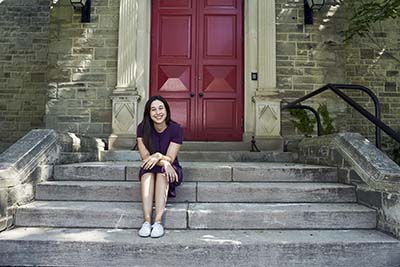 Dr. Yashoda Valliere
Dr. Yashoda Valliere
Medicine
On March 12, 2020, Dr. Yashoda Valliere, MD’20, and her classmates had their last class on campus. On March 13, the University moved classes online due to the COVID-19 pandemic. With only weeks left in their final year of medical school, Dr. Valliere’s class would not ever come together as a class again.
Feeling helpless and frustrated, Dr. Valliere and her peers began discussing what they could do to support their colleagues – those working on the frontlines in hospitals and clinics.
“I feel a tangible difference from what I know today and what I knew two or three years ago. Every step I take, I learn more. And I know when I need to ask for help.” — Dr. Yashoda Valliere
Their plan to provide childcare and other services came together quickly. As schools and daycares were closing, food was disappearing off the shelves in grocery stores, and the anxiety of most Canadians was rising, Dr. Valliere and her peers were scheduling runs to grocery stores and babysitting shifts in London and Windsor.
“Our plan was to set things up to act as a bridge for a few weeks so that families might be able to find permanent solutions to situations of everyday life,” she said.
Born and raised in Toronto, Dr. Valliere says that her close-knit family shaped who she is and formed the values she holds close to her heart today.
With interests in sciences, the arts and the humanities, Dr. Valliere’s undergraduate education included courses in religious studies, social work, women’s studies, as well as the sciences. Her interests also inspired a year working at the Hamilton Urban Core Community Health Centre facilitating the Neighbours, Friends and Families initiative that focused on awareness related to violence.
It was an illuminating experience for Dr. Valliere that sparked a passion for health equity that remains with her today as a family medicine resident.
Dr. Valliere chose Schulich Medicine & Dentistry because of the atmosphere and sense of community, which stood out for her at every turn during the admissions process. After four years, she says she felt supported by everyone from every level, and believes she received an excellent education.
“I feel prepared,” she said. “I feel a tangible difference from what I know today and what I knew two or three years ago. Every step I take, I learn more. And I know when I need to ask for help.”
She admits finishing her program with mixed emotions. She says on one hand, there is some sadness about not marking the end of medical school with the typical celebrations, but on the other hand, she’s proud of her class, who are entering residency in programs across the country eager and ready to provide care.
“I know this means good things for our communities across Canada.”
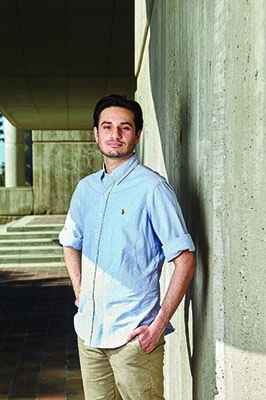 Dr. Ajay Thakar
Dr. Ajay Thakar
Dentistry
When you start off in Dentistry, you really don’t know what you are doing,” said Dr. Ajay Thakar, DDS’20, smiling. “And then months down the line you deliver a denture or provide a crown, and you hear from patients about the difference you have made to their lives. It’s really the best part of dentistry and dental school.”
For Dr. Thakar, missing those patient interactions was one of the hardest parts of the COVID-19 pandemic.
Heading off for March break, Dr. Thakar had no idea that he would not return to campus, to the clinic or to his patients. Prior to leaving, he had taken an impression on a patient thinking he could finish the work when he returned in a week. That was not to happen. And while he continued to receive calls from patients who shared their concerns, he was also managing his own concerns about graduation, writing the board exams for the United States, and completing his studies.
Dr. Thakar always wanted to pursue a health-related career and with two dentists in his family and the idea that after four years of professional school, he could begin to practise dentistry was very appealing.
Through a variety of mentorship and volunteer roles, Dr. Thakar developed strong leadership skills, which he brought with him to Schulich Dentistry. It wasn’t long before he got involved with DOCSKids, and the Dental Academic Research Trainees group at the School. He also became the President of University of Western Ontario Dental Student Society – something he feels a great deal of pride about.
“My peers trusted me and I’ve been able to help a lot of people during the past four years, and I’ve really enjoyed it,” he said.
It was a role he continued throughout the pandemic as students worked together with leadership to ensure solutions were identified for graduating students and accommodations were made when needed.
Despite not having the ‘aha moment’ where it has hit him that he is a dentist, Dr. Thakar is excited to be continuing his learning and training as a resident in an Advanced Education in General Dentistry program in Buffalo. The experience will expose him to more complicated procedures, and allow him to refine his own skills in a supervised and structured environment.
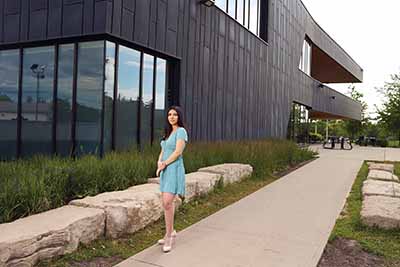 Praneet Gill
Praneet Gill
Bachelor of Medical Sciences
Gaining resiliency and confidence,” said Praneet Gill, BMSc’20, when reflecting on what were some of the best parts of her four years at Western in the Medical Sciences program.
They would come in handy as she grappled with the closing of campus, online courses and exams, and the feeling that things were left unfinished in the classroom and in the lab.
“I developed the ability to adapt to new situations, and learned that trying new things is crucial if you want to succeed.” — Praneet Gill
With a desire to learn more about human health and disease, five years ago, Gill was looking for a program that offered a strong platform for learning and research opportunities. She found that the Bachelor of Medical Sciences Program at Western offered the perfect combination.
Gill says that in the beginning the program was challenging. She had to find a way to adjust to the way classes and lectures were presented and the expectation that students would do more than just memorize the facts. She pressed on and began to focus on learning and developing her skills while achieving the competencies set out by the program.
“I developed the ability to adapt to new situations, and learned that trying new things is crucial if you want to succeed,” she said.
Early in her program, Gill was inspired by the many researchers at the School and the work they were doing. She was matched with Dr. Robert Hegele’s lab as part of the Biochemistry Undergraduate Summer Research program and has continued working in his lab – even remotely throughout the pandemic.
Gill learned that the University was moving classes online while having dinner with her classmates.
“It was disheartening but I knew I wasn’t alone – my friends, colleagues and classmates – we were all in this together.”
As she adjusted to her new reality, Gill searched for a way to fill her time apart from her classes and exams. She decided to start making face masks and enlisted friends and family to help. A Canadian Service Grant and Rising Youth Community Service Grant provided funding for Gill to purchase more materials and engage with and help even more community members.
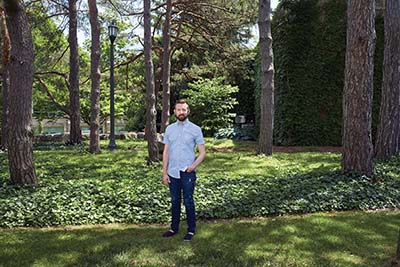 Pierre Thibeault
Pierre Thibeault
Graduate & Postdoctoral Studies
The past five years have been life changing for Pierre Thibeault, PhD Candidate 2020.
“I’ve learned that one of the greatest things I need to overcome is to ignore that inner voice that tells me that I’m not capable of doing what I’m doing. I’ve learned to expand my view of my own capacity,” he said.
He’s done this by putting himself in what he says are uncomfortable spaces and by using his voice.
“I’ve learned that one of the greatest things I need to overcome is to ignore that voice in my head that tells me that I shouldn’t be doing what I’m doing. I’ve learned to expand my view of my own capacity.” — Pierre Thibeault
As a graduate trainee, Thibeault became very involved in the campus community. He served as Chair of the Financial Assistance Committee for the Teaching Assistants’ Union, served as a member and Chair of the Grad Club Committee for the Society of Graduate Students, served as a Society of Graduate Students councillor representing Physiology and Pharmacology, and was involved as the Graduate Student Representative on the research committee for the Physiology and Pharmacology Department. He also serves as the trainee coeditor for the Canadian Society for Pharmacology and Therapeutics.
As a mentor and teacher, he helped to design courses, build OWL sites, lecture tutorials and pursued teaching mentorship from faculty members; accomplishments recognized with the receipt of the George W. Stavraky Teaching Award.
Of all that he has achieved, however, it is research that gives him the most pride. He arrived at Western in 2015 to work with Rithwik Ramachandran, PhD, who at the time was just setting up his lab. It served as a unique opportunity for Thibeault to learn how to get a research program established.
“I’m very proud of my research; it’s been a great experience,” said Thibeault.
Thibeault has studied the molecular basis of signaling from Proteinase activated Receptor-4 (PAR4), a thrombin-activated G-protein-coupled receptor that is an important regulator of the innate immune system response to injury or infection. His research studies have uncovered new insights into PAR4 activation, biased agonism and signaling to aid in the future development of PAR4-targeted therapeutics.
Thanks to some travel awards and a supportive supervisor, Thibeault has been able to share his research
across the country and in the United States, the United Kingdom and Japan.
Thibeault’s lab work ended abruptly when the University moved classes online and closed research labs. And while the time away from the lab meant he could focus on writing his thesis, he found the closure stressful from time-to-time especially because he had only a handful of experiments left to complete his degree.
“It flipped my routine on its head,” he said. “I missed the engagement with people, and felt the loss of those immediate and natural connections that came with my daily routine.”
Along the way, Thibeault felt a sense of solidarity with his peers as they planned the next steps in their academic and career journeys.
“This time is going to bring out the resilience and resolve we all have,” said Thibeault, who happily headed back to the lab in June.









